Wednesday Feb 18, 2026
Wednesday Feb 18, 2026
Monday, 21 August 2023 00:15 - - {{hitsCtrl.values.hits}}
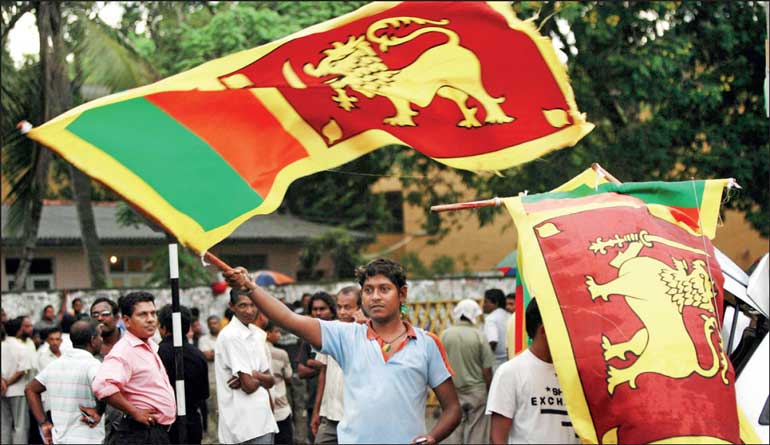
If people are to enjoy economic democracy, they should have the right to choose economic
policies that serve them well
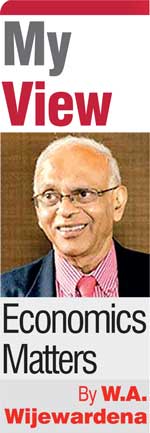 As I mentioned in the previous article in this series, an important requirement of the social market economy policy being pursued by the Ranil Wickremesinghe administration to deliver richness to Sri Lankans by 2048 is the delivery of the economic democracy to people. However, economic democracy has not been defined and the administration seems to expect the people to intuitively understand it. Hence, it is necessary to understand what it is and what should the people expect of it.
As I mentioned in the previous article in this series, an important requirement of the social market economy policy being pursued by the Ranil Wickremesinghe administration to deliver richness to Sri Lankans by 2048 is the delivery of the economic democracy to people. However, economic democracy has not been defined and the administration seems to expect the people to intuitively understand it. Hence, it is necessary to understand what it is and what should the people expect of it.
Light treatment of Lincoln’s definition of democracy
Political democracy has been enjoyed by Sri Lankans since independence in 1948 with power to elect or oust governments in periodical elections. Many analysts have drawn on Abraham Lincoln, the 16th US President, to describe what it is. Lincoln, battling a civil war, stressed to fellow Americans in his very short but powerful Gettysburg Address of 1863 that American nation shall not allow democracy which is a ‘government of the people, by the people, for the people’ to perish from the earth. His concern was that democracy being such a precious asset should not be dismissed lightly by any freedom loving person.
When this was raised in Parliament in August 2023 by the Opposition leader immediately after Wickremesinghe addressed it, he in fact took it very lightly questioning the opposition whether it expects him to do everything which Lincoln had done as the President of the United States. His reference was that Lincoln had dissolved several states which had voted for separation from the Union and whether he should also follow the suit. Wickremesinghe won the argument for the time being but that should not have been the response of a leader who has promised to follow the social market economy ideology to deliver prosperity to fellow citizens.
Democracy can be captured by powerful groups
Since Lincoln’s original pronouncement, his description of democracy as people’s government has become the standard definition of political democracy. But the defect of this definition, as many critics have pointed out, has been that the people under reference may not be the masses at large but only a few individuals belonging to an exclusive class that has captured political power through popular elections. This is self-evident in Sri Lanka. As popular cartoons have depicted, during election times, politicians approach the voters with bent backs and wide smiles across faces. But after the elections, the roles are reversed where voters approach elected politicians with bent backs in total subjugation. Hence, democracy has been viewed as a form of government of which there is no voice for the people. This criticism, levelled against political democracy, is equally valid for what is now known as ‘economic democracy’ as well.
Economic democracy is ensuring freedom to choose
But the problem with economic democracy has been that it has been captured by many interested parties to propagate their own political and economic ideologies. Hence, there is no consensus as to what it should consist of. At one end, there are free market economists who believe that economic democracy should consist of people’s freedom to choose. This was the message delivered by Nobel Laureate in economics, Milton Friedman in his 1980 book ‘Free to Choose: A Personal Statement’ written with his economist wife Rose Friedman. The book was based on their previous publication, ‘Capitalism and Freedom’. In the Preface to Free to Choose, the Friedmans qualify their effort as follows: “Capitalism and Freedom examines the role of the competitive capitalism – the organisation of the bulk of economic activity through private enterprise operating in a free market – as a system of economic freedom and a necessary condition for political freedom”. The Friedmans go on labelling both the political system and the economic systems as markets “in which the outcome is determined by the interaction of persons pursuing self-interests (broadly interpreted) rather than by the social goals the participants find it advantageous to enunciate”. The corollary is that the symmetry in the two system indicates that if political democracy fails, so does economic democracy and vice versa.
Big government takes freedom of choice away from people
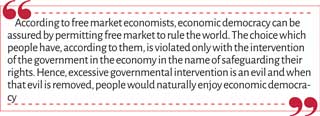 But according to the Friedmans, the cause of the failure has been due to the expansion of the government sector beyond what it should have been. When the freedom to choose is taken away from people and handed to a group of politicians and bureaucrats, the inevitable result is that choices are made not to benefit the people but to benefit the latter group which works in self-interest. This is known as ‘agency problem’ in economics. In terms of the agency problem, the agents, namely, politicians and bureaucrats, who are supposed to work for the benefit of the principals, namely, people who appoint and pay them, act in collusion to serve their personal interests forgetting the interests of the people. Thus, after elections, they act as masters of people instead of being their servants. That is the source of the failure of political democracy.
But according to the Friedmans, the cause of the failure has been due to the expansion of the government sector beyond what it should have been. When the freedom to choose is taken away from people and handed to a group of politicians and bureaucrats, the inevitable result is that choices are made not to benefit the people but to benefit the latter group which works in self-interest. This is known as ‘agency problem’ in economics. In terms of the agency problem, the agents, namely, politicians and bureaucrats, who are supposed to work for the benefit of the principals, namely, people who appoint and pay them, act in collusion to serve their personal interests forgetting the interests of the people. Thus, after elections, they act as masters of people instead of being their servants. That is the source of the failure of political democracy.
In terms of economic democracy, it is the people who should make choices for themselves. But politicians and bureaucrats who appropriate the right to choose on behalf of people will make choices that are beneficial to them or a select group of people and not to the people at large. But the irony is that it is the people themselves who ask the politicians and bureaucrats to make choices on their behalf. Acting under those powers, they pass legislations of numerous kinds and impose rules and regulations on private behaviour claiming that they all are done to serve the people. But in the process, they grab more and more powers to take the freedom to choose away from the people. The Friedmans say that there is an invisible political hand operating to promote ‘special interests’ of those who back politicians instead of promoting ‘general interests’ which they are supposed to do.
Milton Friedman: Governmental solutions create more problems for people
The Friedmans claim that the solutions suggested for overcoming the problem of abuse of power by politicians and bureaucrats do eventually become another problem leading to a big government. First, a government institution is created to provide a service to people. When that institution fails, another institution is created to check on its work. That institution will function as a regulatory body with enormous powers assigned to it by laws. Acting under those laws, they issue rules and regulations in the name of protecting people from the abuses of the governmental institutions. But little they realise, according to Friedmans, that their action is the problem rather than the solution. Hence, as Friedmans have put it “they inevitably become persuaded that they are indispensable, that they know more about what should be done than uninformed voters or self-interested businessmen”.
It is people who give extra powers to governmental authorities
But the result is the growth of a government in size and power affecting the relations which a citizen is having with his government. When the government becomes too big, citizens also cultivate the habit of seeking favours from their elected politicians to move the bureaucracy that does not move at the speed they expect it to do. This gives extra powers to politicians and instead of working for the general interests of the people who have brought them to power, they start working for the special interest groups that cultivate relations with them. This leads to possibilities for bribery and corruption. Finally, for citizens to have services from the government they have created, they must give more powers to politicians and to high level bureaucrats handing their right and freedom to choose to the latter group. Thus, new legislations are introduced using rhetoric and labels that they are intended to serve the public whereas they are intended to provide a better service to special interest groups. This natural bias in favour of the governmental intervention is the source of the failure of both the political democracy and the economic democracy.
Hailing free market economy as assuring freedom to choose
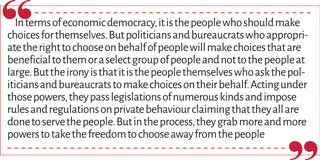 Hence, according to free market economists, economic democracy can be assured by permitting free market to rule the world. The choice which people have, according to them, is violated only with the intervention of the government in the economy in the name of safeguarding their rights. Hence, excessive governmental intervention is an evil and when that evil is removed, people would naturally enjoy economic democracy. But not everyone subscribes to this view.
Hence, according to free market economists, economic democracy can be assured by permitting free market to rule the world. The choice which people have, according to them, is violated only with the intervention of the government in the economy in the name of safeguarding their rights. Hence, excessive governmental intervention is an evil and when that evil is removed, people would naturally enjoy economic democracy. But not everyone subscribes to this view.
The criticisms have come from non-economist leftist writers as well as from mainstream economists.
J.W. Smith: The current world order has destroyed economic democracy
Of the leftist writers, a key figure has been J.W. Smith who wrote a treatise on the subject in 2005 under the title ‘Economic Democracy: The Political Struggle of the Twenty First Century’. His thesis has been that in the current world economic order with corporations and Western advanced economies choosing on behalf of people, there is no economic democracy in the world. Corporations have become an imperialist force taking advantage of the disabilities and poverty of poor countries. They, by funding think-tanks that ideologically support their presence, have interfered with freedom of thought enjoyed by people in both developed and developing countries. Developed nations, through international organisations, unequal trade, money, and finance have suppressed the choices of people in poor countries. To save the world from these unsavoury interferences, Smith suggests having a system of common resources to be enjoyed by people in both rich and poor countries in the areas of world currency, financial system, lands, technology, and internet through Wi-Fi. For him, economic democracy is having an egalitarian society across the world.
Shortcomings in Smith’s claim
There are several weaknesses in this type of economic democracy. First, it disregards the valuable contributions made by corporations in developing new technologies and introducing innovations that have helped people throughout the world. Hence, dismissing them with a single statement that all corporations are exploitative, imperialistic, and serving only the interests of their owners is far from the truth. For instance, in the modern times, the contribution made by Google or Apple of USA in making high technology affordable to people throughout the globe could not be dismissed lightly. Second, a common resource base as suggested by Smith will lead to ‘the problem of the commons’ where no one has incentive to develop a common property but to enjoy the benefit without paying. Hence, common resources are to deplete faster than privately held resources. Third, trade is not imposed on poor countries by the rich countries but allowed to take place voluntarily. Fourth, international institutions which Smith alleges as serving the interests of only the rich countries are in fact serving the whole world equally. Hence, it is not advisable to go for the type of economic democracy suggested by non-economist leftist writers.
Ha-Joon Chang criticising the market system
Of the mainstream economists, one leading critic has been the Cambridge University Don Ha-Joon Chang who makes his views known through bestselling publications as Milton Friedman has done. In his 2010 book, ‘23 things they don’t tell you about capitalism’, Ha-Joon makes a serious indictment on those who believe in the working of the free-market economy system properly and those who believe that big governments are bad. According to him, there is no such thing as a free market and therefore, to believe that there is freedom choice in the free-market system is a myth. He further contends that leaving everything to the market will not be a good idea since markets too fail due to market participants’ having no capacity to act rationally. To substantiate his argument, he draws on Nobel Laureate Herbert Simon’s concept of ‘bounded rationality’. Simon says that people are unable to make rational choices since they are constrained by lack of information, time, and brainpower. Hence, the rationality of people is bounded by these limitations. Ha-Joon also contends that welfare states characterised by big governments are not necessarily bad since they allow people to take more chances with their jobs or economic decisions. Hence, big governments, according to him, do not restrict the freedom of choice but enhance it.
Big governments do not choose for people
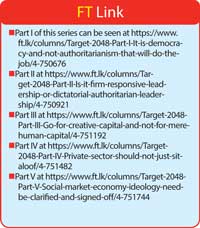 What Smith, Ha-Joon and all others who write on these lines have forgotten is that big governments taking over the function of choosing for people do not choose for people but for those in power. Hence, it is like the shortcoming in democracy, the power to rule others is captured by a select group of people placing all others under their subjugation. True economic democracy requires avoidance of this possibility.
What Smith, Ha-Joon and all others who write on these lines have forgotten is that big governments taking over the function of choosing for people do not choose for people but for those in power. Hence, it is like the shortcoming in democracy, the power to rule others is captured by a select group of people placing all others under their subjugation. True economic democracy requires avoidance of this possibility.
Economic decisions being made for the benefit of special interest groups
Sri Lanka, in promoting economic democracy, should not get into this ideological debate. Each side of the debate has plus points as well as minus points and therefore serves as a poor guidance for policy. If people are to enjoy economic democracy, they should have the right to choose economic policies that serve them well. This is valid irrespective of whether a country is pursuing a free-market economy policy or a planned economy policy. Under any system, making economic decisions should not be left to politicians or bureaucrats who are simply interested in promoting their own self-interest and not the interests of the people. As such, many large infrastructure projects that have been undertaken to promote the self-interests of top political leaders or groups of people associated with such political leaders have ended up in failure. Many examples could be found in this regard from Sri Lanka’s recent economic history.
Need for having wide consultations for economic policy making
This calls for introducing suitable mechanisms to have wide consultations on economic policies that are being implemented by the government. That applies to micro-level policies as well as to macro-level policies. In the case of micro-level policies, people who have a stake in that policy should necessarily be given an opportunity to express their views on the policy. Once these views are known, the policy could be abandoned completely if there is wide public opposition to it or implement it with suitable modification having taken the public views into consideration. At macro-level, even the monetary policy being implemented by the Central Bank should come under this public scrutiny. In the present circumstances, the Central Bank implements its policies ex parte without giving a chance for people who are affected by its policies to express their views on them.
Empower civic society institutions to represent people
But one difficulty that may be encountered in a wide public consultation is the diversity of views of people and their ability to make a logical evaluation of government’s economic policies. It will also be costly and time consuming to have a wide public consultation. To overcome these problems, two mechanisms could be suggested. One is to allow civic society organisations to represent the public. The other is to use the social media to gauge the views of the public on the policies being proposed. When the internet penetration becomes universal in the country, it will not be difficult to seek the views of the people on economic policies through social media.
Poor track record of Wickremesinghe administration
The track record of Wickremesinghe government relating to economic democracy so far is very poor. It is bent on making decisions without consulting the stakeholder groups to which they apply. Selecting superannuation funds for domestic debt optimisation, continued power cuts when students were preparing for a national level examination, decision to deprive the farmers of irrigation water, and illogical price controls on poultry products are some of them. As a recent OECD report has recommended to Germany, the country of origin of the social market economy ideology, policymakers “should maintain a continuous dialogue with stakeholders throughout the preparatory stage” of a policy. It also has recommended the wide use of e-participation for conducting such a dialogue effectively and efficiently.
These are matters which should not be treated lightly if Sri Lanka desires to deliver richness to its people by 2048.
(The writer, a former Deputy Governor of the Central Bank of Sri Lanka, can be reached at [email protected].)